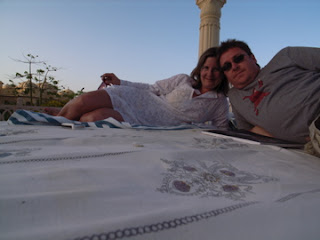China: Two steps forward, one step backward
I bought some medicine from a large supermarket chain the other day. It was interesting to see a holographic seal on the packaging and on the medicine lid itself. The seal explained that this was a anti-counterfeit measure - and it featured a unique reference code which you were encouraged to enter onto the manufacturer's website to ensure it was not a fake.
We're used to seeing fake designer fashion brands; watches and DVDs over here - but I must admit, I was not expecting to see fake pharmaceuticals. But then again, it makes sense given the amount of $ involved.
It's a crap world when people try to make a quick buck by faking medicines - medicines which people buy in trust. Joss and I will be thinking twice about the medicines we get from now on that's for sure.
This all came to a head yesterday, of course, with the Chinese courts sentencing Zheng Xiaoyu, their ex-Minister for food & drugs standards, to death by firing squad. All because he took c.£425,000 in backhanders for turning a blind eye to drug accreditation. I don't agree with the death penalty, but his behaviour has sentenced many hundreds of others to death around the world.
There are 4000+ manufacturers of drugs in China - on TV yesterday we were shown scenes of the devastation to lives their practices have caused all around the world ... South America in particular has been deluged with cheap fake drugs stemming from China. One case we saw was of a Peruvian boy taking cough medicine only to end up with brain damage caused by some errant ingredient in the syrup.
Maybe the death penalty was right in this instance.
Anyway, to coincide with the death penalty sentencing, China announced a shake-up in its Drug licensing administration. About time too!
M
From the BBC...
China's drastic solution to drugs scandal
By James Reynolds
BBC News, Harbin
Zheng Xiaoyu was in charge of making sure his country's food and drugs did not kill anyone.
But, on Tuesday morning in Beijing, a court found that he had failed - badly.
He was found guilty of accepting bribes and of lowering safety standards.
For his failure, he will be shot dead.
After the court's verdict was announced, my colleagues and I flew to the northern Chinese city of Harbin.
We met two families who tell us they bought contaminated drugs supplied by the Anhui Huayuan company.
Guo Ping lays out pictures of her daughter Liu Sicheng. They show the girl wearing a white dress and a small tiara.
Last summer the six-year-old caught a cold. So, her mother gave the girl some antibiotics she bought for 10 yuan (75p).
"I gave just a little bit", Guo Ping says, squeezing her fingers together.
On 24 July, after an antibiotic injection, the girl died.
"I think the court's verdict is heavenly justice," Guo Ping says.
Du Haipeng was given antibiotics last year and is now brain damaged
"The man deserves his punishment. This shows that the world still has justice."
Then she begins to cry.
"I dream about my daughter all the time. I see her staring at me, telling me she shouldn't have died. She tells me I must get justice for her. I have to do so. Otherwise I won't be able to face her when I die."
At the end of the room, six-year-old Du Haipeng lies still on a sofa. He was given the antibiotics last year. Now he has severe brain damage.
"When I heard the news of the sentence, I felt very excited," says Du Haipeng's uncle, Wang Guo Biao.
"Our boy took the fake drug approved by this man and his organisation. Our boy will never recover."
For everyone involved in this case, the cost has been high.
The antibiotics have been recalled. The batch has been blamed for 11 deaths.
Last November, the general manager of the Anhui Huayuan drug company, Qiu Zuyi, was found dead. The official Chinese media said that he hanged himself.
China has promised to get rid of its supply of fake and contaminated drugs. It carries out periodic raids, and calls in cameras to take pictures of its hauls.
But the outside world is sceptical. This year alone, there have been reports of contaminated Chinese drugs ending up in Panama, the Dominican Republic, and the United States.
The Chinese Communist Party now realises it has a huge problem - fake drugs made in this country kill people.
The state hopes it can make things better by ordering its old drugs regulator to be shot.
China's solution is as drastic as its problem.




















































